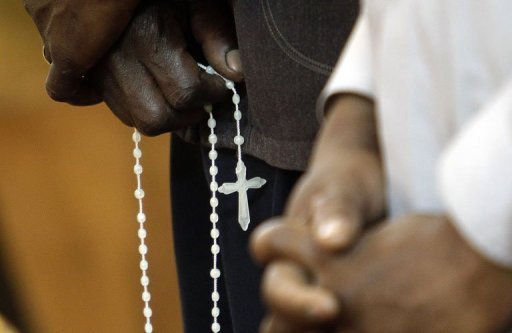Thirteen people have been arrested since Wednesday as police intensify efforts to locate the perpetrators involved in last week’s violence surrounding sectarian strife in Minya.
The Ministry of Interior said in a statement that the prosecution ordered the detention of the suspects, and ordered the arrest of another four.
Although officials in the Egyptian state, including President Abdel Fattah Al-Sisi, instructed respective authorities to hold accountable those who are responsible for the sectarian strife, religious officials are pushing to solve the incident in an “unofficial way”.
One day after the incident went viral, the state-sponsored Al-Azhar institution sent a 40-man delegation to Minya to contain the situation, while the Ministry of Religious Endowments said that more than 20 preachers will be sent to the governorate to organise dialogue between the conflicting sides. Al-Azhar also said that the matter should not be used politically to increase religious strife. Similarly, Dar Al-Ifta warned against the dangers of sectarian strife to the “homeland”.
Archbishop Makarius of Minya said security forces are working to arrest the perpetrators of the incident and the church is in contact with them. Makarius said the incident should not be allowed to slip from the radar, for it could be repeated.
Makarius hopes for a transparent investigation, adding that religious figures in Egypt should handle the matter in a religious matter and not a political matter. He advised that security should be strengthened in areas where tension is expected.
In an official statement, Makarius thanked the efforts of President Abdel Fattah Al-Sisi, hoping for the implementation of the rule of law and the development of Minya governorate.
Meanwhile, Muslim religious officials have been mobilising to resolve the conflict in what is known as extra-judicial community justice meetings, which includes elderly figures from different sects, whereby a truce or peace is reached. The act is usually attended by governmental authorities and security personnel.
For example, the Egyptian Family Organisation, an unofficial religious body, hinted in statements that “relatives of the Muslim suspects in the incidents are ready to reconcile with their Coptic counterparts”, as reported by state media. The organisation said that representatives from the different sides as well as governmental institutions visited the villages.
On Wednesday, the Coptic Orthodox Church issued a statement revealing the details of the incident, which was brought to the attention of the church after one of the victims, came forward on Wednesday to complain to church officials about what happened. The church claimed that dozens of Muslims looted and torched houses that belonged to Coptic Christians.
Soaad Thabet, 70, was forced out of her home by an angry mob on Friday, dragged in the street, beaten, and had her clothes ripped off, according to a statement by the archbishop.
The incident began when a rumour about an alleged affair between Thabet’s son, Ashraf, and a Muslim woman sparked tensions in Al-Karam village in Minya, leading to threats against Ashraf who subsequently left the village. One day later, a group estimated at more than 200 people looted and torched at least seven homes belonging to Coptic families, according to the archbishop’s statement.
Daily News Egypt spoke to some residents in the village to tell the story of the attack.
“On Thursday evening at around 7pm, about 30 people stormed my home. They were carrying guns and knives. They burned my plough and not only my home but also seven homes owned by other Coptic residents were reportedly burned,” Fadal, a resident of Al-Karam village told Daily News Egypt on Saturday.
He asserted that the woman’s husband’s family is responsible for the burning of Copt’s homes. There are not many Coptic residents homes are few. The perpetrators first stormed the houses and destroyed their furniture and belongings before setting everything alight.
Fadal refused to be included in any reconciliation sessions, arguing that these sessions are mainly aiming to allow the perpetrators escape justice.
“We are hoping that the law will be applied fairly against the perpetrators. My family and I were in real danger due to an incident that we were not even a part of,” he said.
Abanaob, a political activist based in Minya, was one of the attendees of the first reconciliation session held under the auspices of the Bayt El Aela [Family Home] initiative that was launched by Al-Azhar. He said the session was held in the absence of Coptic residents or representatives who refused to attend as they thought the sessions would result in monetary compensation without referring perpetrators to the prosecution.
“The incident of stripping the elderly Coptic lady is clear evidence against the perpetrators. The residents wholly refuse any reconciliation sessions or compensation,” he clarified.
On Friday, an official reconciliation session was held with the attendance of high-ranking officials including the governor of Minya. Coptic representative or residents were also absent at this session, despite it being held in Al Karam where the incident took place, according to an eyewitness who attended the session.
He told Daily News Egypt on condition of anonymity on Saturday that the session was meaningless due to the absence of the Coptic representatives.
“What happened to the elderly lady is totally unacceptable, and all perpetrators should be immediately referred to trial,” he said.
A report by the Egyptian Initiative for Personal Rights (EIPR) for June 2015 on the response by local communities to sectarian tensions, claims that the sessions to address community problems have a negative effect.
The report documented the use of “customary reconciliation sessions” in which figures of a local community gather to resolve disputes, typically between Christian and Muslim families.
The use of these sessions, though long-established, spiralled after the ouster of Mohamed Morsi and his Muslim Brotherhood regime in July 2013, with over a third of Egyptian governorates documented as using them, especially in Minya.
When incidents such as the above occur, one of the main reasons that local communities turn to customary reconciliations sessions is that they are a quicker and cheaper method than going through the official legal system, which can take years to resolve disputes.
While the majority of customary reconciliation sessions occur in the countryside and away from the seat of the government in Cairo, some have also taken place in the capital.



